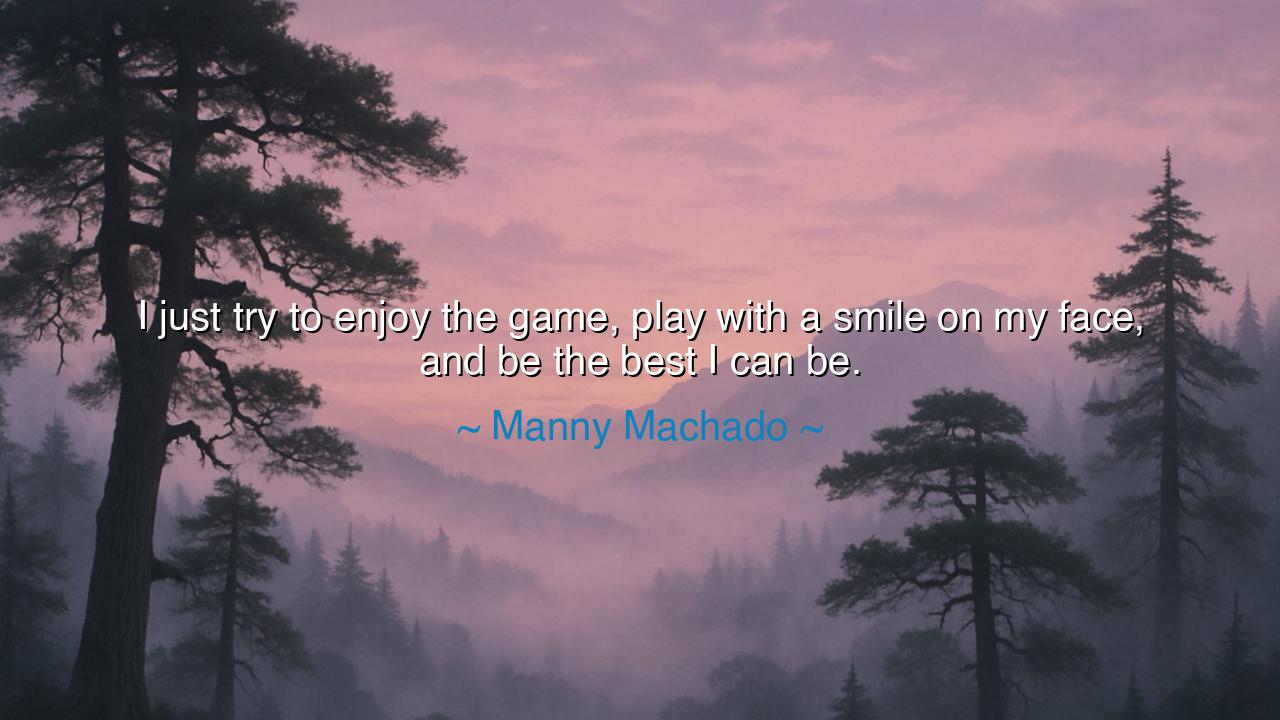
I just try to enjoy the game, play with a smile on my face, and






Hear the words of Manny Machado, a craftsman of the diamond and a bearer of joy in the game: “I just try to enjoy the game, play with a smile on my face, and be the best I can be.” Though spoken of baseball, these words are no less a philosophy of life. For in them lies the essence of balance: that excellence is not born from grim striving alone, but from delight, from gratitude, from the courage to bring joy into labor. To play, to smile, to give your all—this is a wisdom older than sport, older than nations, as ancient as the first worker who found meaning in his toil.
The origin of this wisdom is simple yet profound. Machado, in speaking of the game, reminds us that play is not frivolous, but sacred. From childhood, we first learn through play, discovering the world with laughter. As adults, though we take on burdens, the spirit of play—the joy of creating, competing, building, striving—remains the wellspring of greatness. When Machado says he must enjoy the game, he recalls to us the truth that love of what you do is the fire that sustains discipline. Without joy, even the strongest arm or keenest skill soon withers.
The ancients themselves spoke of this. Aristotle taught that the highest function of man is not only to work, but to work with virtue and fulfillment—to flourish, to find harmony in labor. Likewise, Confucius said, “Choose a job you love, and you will never have to work a day in your life.” Machado’s smile on the field is a visible sign of this harmony: it is the mark of a soul at peace in its calling. The wise knew that joy and discipline together create greatness, and without joy, discipline alone turns into drudgery.
History gives us images of this truth. Think of Pelé, the great footballer, whose very face shone with delight each time he touched the ball. His artistry was not merely skill but a form of worship, as though he celebrated life itself with every pass, every goal. His smile inspired not only his teammates but entire nations, showing that to pursue mastery while radiating joy is to elevate both sport and spirit. Machado’s words stand in this same lineage: greatness adorned with gladness is the noblest kind of greatness.
Yet, his quote also speaks of striving to be the best. The smile is not an escape from effort, but a companion to it. For Machado does not say, “I smile and accept mediocrity.” He says, “I smile while being the best I can be.” This is the true lesson: that joy is not contrary to discipline, but its strongest ally. A weary worker breaks sooner than one whose heart delights in the task. A burden carried with resentment crushes the soul, but the same weight borne with a smile strengthens the spirit.
The teaching, then, is this: embrace your labor with enjoyment, pursue your calling with discipline, and wear a smile as you do so. Do not separate excellence from joy, as though they were enemies. Instead, weave them together, so that in your striving you inspire others, and in your joy you sustain yourself. In this way, your life becomes both a victory for yourself and a light for those around you.
Therefore, beloved, let this be your practice: whatever your game may be—whether it is your work, your art, your service, or your learning—enter it with joy. Do not let life’s seriousness steal from you the playfulness of the spirit. Strive to be your best, but carry the journey with laughter, with gratitude, with a smile. For when you live in this way, not only will you reach excellence, but you will also bless all who watch you, teaching them, as Machado has, that the path to greatness is paved with joy.






AAdministratorAdministrator
Welcome, honored guests. Please leave a comment, we will respond soon